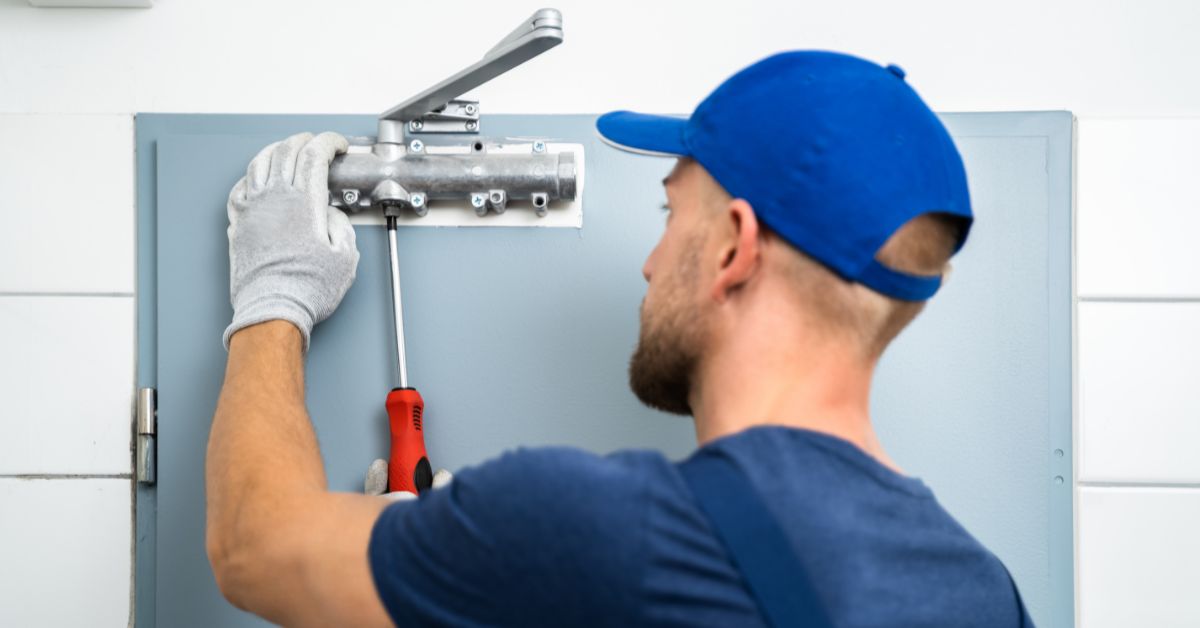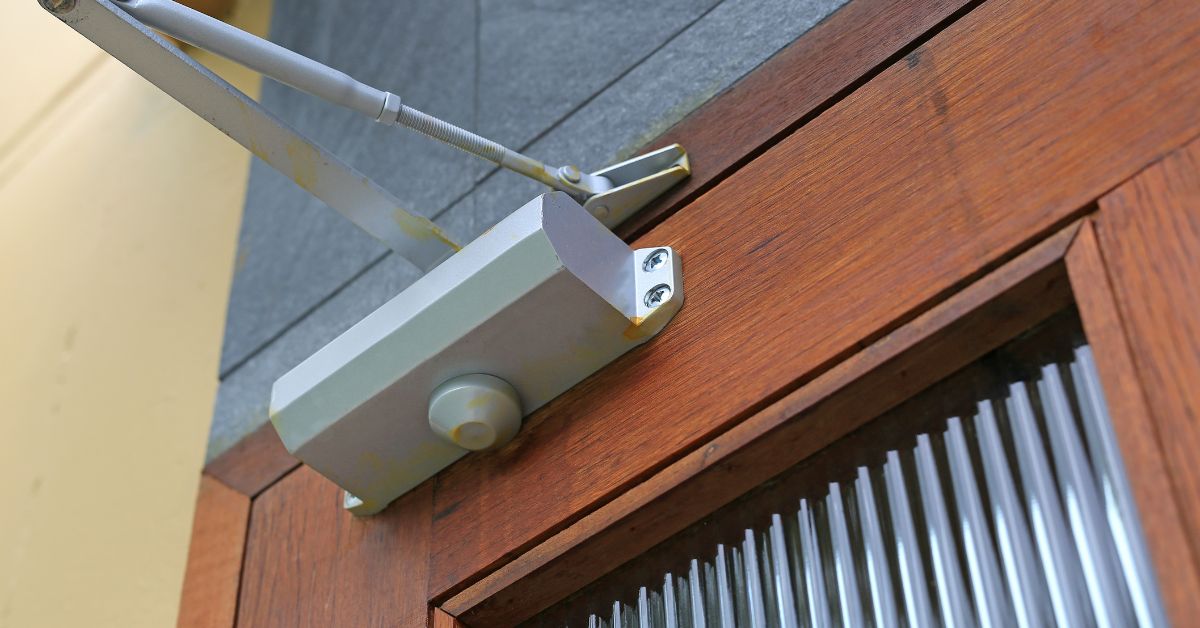7 Signs It’s Time To Replace Your Door Closer

Why Is Your Door Closer Important?
Effective door closer hardware is vital for your facility. The four main roles they play include the following:
- A properly functioning door closer prevents accidents and makes sure doors close securely and don’t injure anyone by slamming unexpectedly.
- Door closers keep doors sealed, reducing drafts and maintaining temperature regulation inside the building. This helps you save on heating and cooling costs.
- Many commercial buildings rely on door closers for fire-rated doors that prevent the spread of flames and smoke during an emergency.
- Door closers allow for smoother entry and exit and improve accessibility for employees and visitors alike.

Signs Your Door Closer Needs Replacement
Recognizing the early warning signs of door closer failure can help you act before it becomes a bigger issue. Look out for the following indicators in your commercial doors.
Leaking Hydraulic Fluid
Hydraulic fluid controls the door’s speed and ensures smooth operation. If you notice oil stains on the floor near the door or see visible fluid leaking out of the mechanism, this is an immediate red flag.
Leaking fluid can severely impact the door closer’s functionality, causing it to open or close too fast or too slowly. This compromises both performance and safety.
Doors That Slam or Don’t Latch Properly
When a door slams shut or doesn’t close fully, it’s often a sign of internal problems with the door closer. This could be due to worn-out components or internal pressure imbalances.
Additionally, slamming doors can lead to damage to both the door and its frame over time. On the other hand, doors that don’t latch properly leave your facility vulnerable to unauthorized entry and energy leaks.
Difficulty Opening or Closing the Door
If opening or closing the door suddenly feels like a workout, your door closer may be nearing the end of its usefulness. This could mean the springs inside the closer are wearing down or that excessive resistance indicates a mechanical failure.
This inconveniences users in high-traffic locations and creates accessibility challenges, particularly for people with disabilities.
Unusual Noises
A door closer should operate quietly. If you start hearing strange noises like grinding, squeaking, or clicking, there’s probably wear and tear.
These sounds could come from poorly lubricated components, misalignment, or internal damage. Ignoring these noises will likely lead to further deterioration and additional costs down the line.
Physical Damage
Visible damage to the door closer or adjacent parts of the door mechanism is another common indicator that it’s time to replace. Cracks, warping, or bent arms and springs show that the closer can no longer function correctly.
Physical damage may result from consistent heavy use, vandalism, or wear over time. Continuing to rely on a damaged closer puts unnecessary strain on your door system.
Struggling To Adjust Speed Settings
Many door closers allow you to adjust the door’s closing speed. If your door still doesn’t respond properly after you adjust the settings, the internal mechanisms may have failed.
This malfunction has the potential to disrupt the usability of the door, plus it poses a safety risk since it could lead to sluggish or abrupt door movements.
Aging or Outdated Design
Finally, take a look at the age of your door closer. Most door closers have a lifespan of seven to 10 years under typical conditions. If yours has been in use for over a decade, you can save yourself from issues by replacing it proactively.
Plus, upgrading to a modern, high-quality door closer can sometimes provide features like energy efficiency enhancements and better aesthetics. With these added benefits, you’ll add even more value to your building.

Why Timely Replacement Matters
Replacing a worn-out door closer is both a necessary part of preventative maintenance and a way to avoid unnecessary risks. These risks include the following:
- A malfunctioning door closer can create unsafe conditions that may result in injuries.
- Continuing to use a faulty closer usually ends up damaging other parts of the door system, leading to higher repair or replacement costs.
- Commercial buildings legally must meet specific fire safety and accessibility standards. With a failing door closer, you could put your company at risk of non-compliance.
- A deteriorating closer leads to drafty, inefficient spaces by compromising the seal between rooms.
Steps to Replace Your Door Closer
If you’re ready to replace your door closer, follow this simple action plan.
Inspect Your Existing Door Closer
Determine the exact problem with your current closer. Look for the signs outlined above, and make note of the closer’s type, model, and size.
Choose the Right Replacement
Make sure your new door closer is compatible with your door’s dimensions, weight, and function. For commercial applications, consider heavy-duty models designed for high-traffic use.
Hire a Professional for Installation
While replacing a door closer might seem like an easy DIY task, you should leave it to the professionals to guarantee proper alignment, adjustment, and functionality.
Schedule Regular Maintenance
Once you install your new door closer is installed, commit to periodic inspections and maintenance. This keeps your closer functioning optimally for longer.
Keep Your Business Doors Functioning Smoothly
A reliable door closer is an essential component in maintaining the accessibility, safety, and energy efficiency of any commercial building. By regularly inspecting your door hardware and knowing the seven signs it’s time to replace your door closer, you can prevent further complications and save money in the long run.
If you’ve noticed any of the signs we’ve discussed, don’t hesitate to take action! DoorHub offers a wide selection of door closer hardware, so take the necessary steps to inspect and replace your door closer to keep your building operating at its best. Remember, your building deserves doors that work just as hard as you do.

Author
Michael Rega
Chief Marketing Officer and founding Member of DoorHub.com